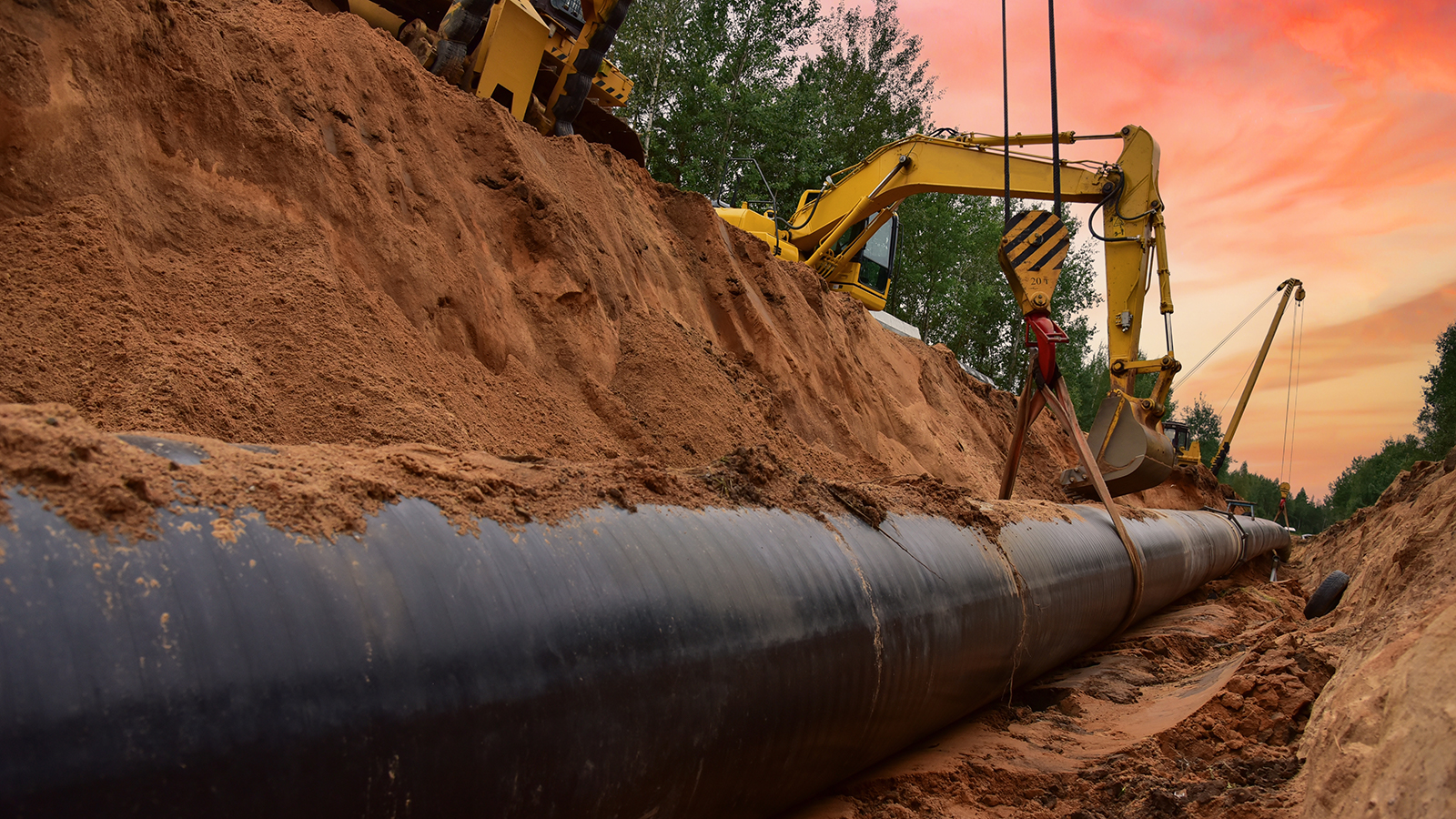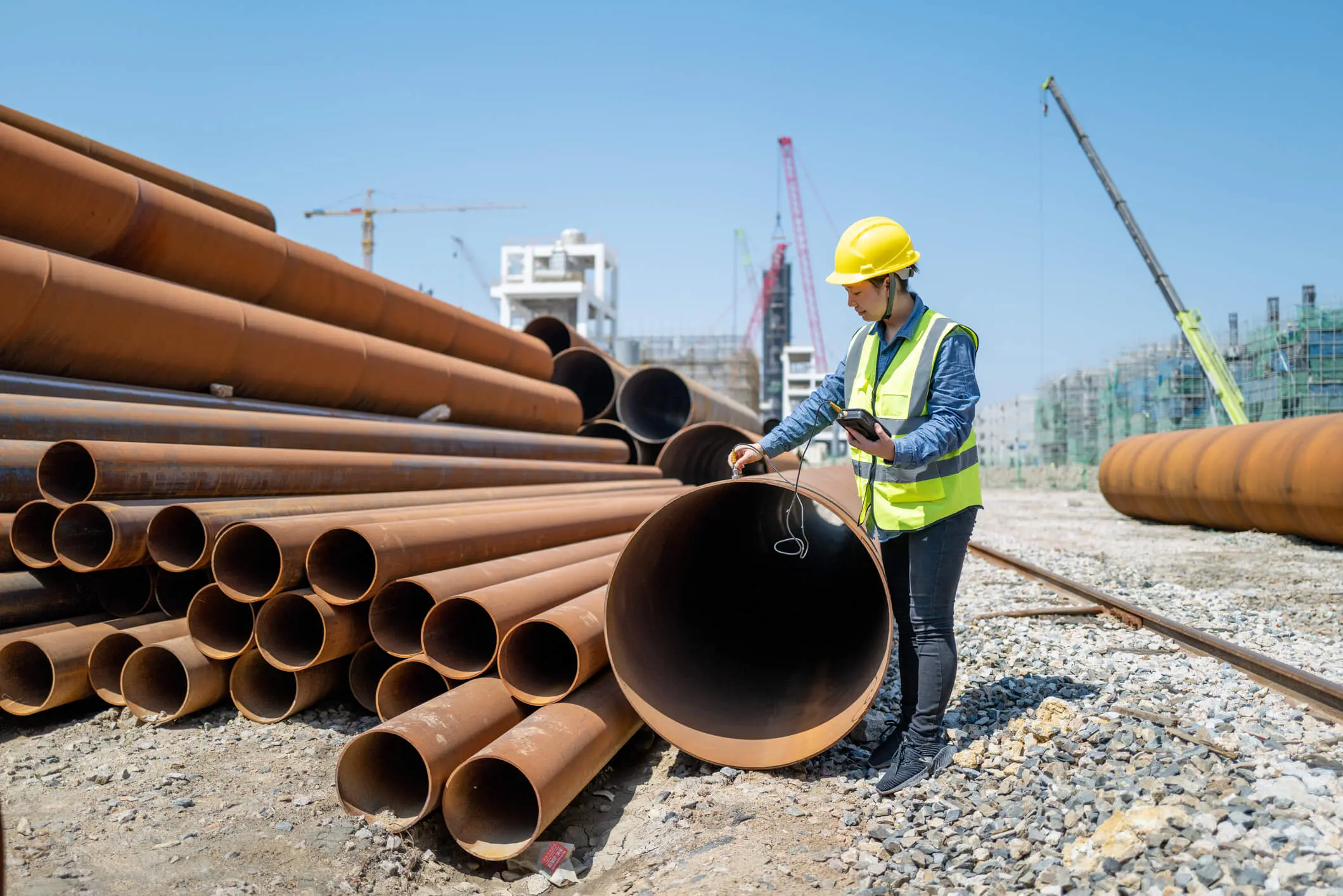A Comprehensive Overview to Recognizing Pipelines and Their Function in Building
Pipes are essential components in construction, offering crucial features in gas, water, and waste administration. Their option and application can considerably affect a structure's efficiency and safety and security. Various products, such as PVC, copper, and PEX, offer distinctive benefits suited to specific demands (Creek Pipe Pipeline Construction). Comprehending these aspects is key for any building task. As one discovers the details of pipelines, the effects for conformity and public wellness ended up being significantly apparent
The Importance of Water Lines in Building and construction
Pipelines work as essential channels in construction, facilitating the movement of water, gas, and waste throughout structures and framework. Their duty extends beyond plain transport; they are essential for guaranteeing the functionality and safety of domestic and commercial environments. Correctly set up pipelines add to the efficient circulation of sources, enabling daily tasks such as home heating, food preparation, and bathing. Pipes play an essential function in waste management, guaranteeing that sewer and wastewater are properly gotten rid of from living spaces.The importance of pipes is additionally reflected in their effect on public health and wellness. Poor or faulty piping systems can lead to contamination and dangerous conditions, making quality products and installment practices necessary. In addition, pipes have to abide by numerous building ordinance and guidelines, which are made to shield both residents and the atmosphere. As a result, the significance of pipelines in building encompasses both useful functionality and essential health factors to consider.
Kinds Of Water Lines Made Use Of in Structure Projects
Various sorts of pipelines play a substantial duty in structure jobs, each developed to meet specific demands and applications. Amongst one of the most generally utilized pipeline kinds are PVC, which is lightweight and immune to corrosion, making it ideal for drainage and vent systems. CPVC pipes, similar to PVC, can withstand higher temperatures, commonly made use of in hot water systems. Copper pipes are recognized for their longevity and integrity, often used in plumbing and home heating applications. Galvanized steel pipelines, while much less typical today, were as soon as a requirement for water system lines due to their stamina. Additionally, PEX (cross-linked polyethylene) pipelines are gaining popularity for residential pipes as a result of their adaptability and resistance to scaling and chlorine. Cast iron pipelines are favored for their sound-dampening residential or commercial properties, commonly made use of in waste and dirt systems. Each pipeline type offers unique features, ensuring effective procedure in building and construction jobs.
Typical Materials for Pipeline and Their Quality
In construction, the option of pipeline materials is important for making certain sturdiness and functionality. Metal pipes provide stamina and resistance to high stress, while plastic pipes give corrosion-resistant and light-weight alternatives. Composite pipes incorporate the advantages of both products, making them functional alternatives for various applications.
Metal Pipe Options
Steel pipelines are integral components in building and construction, supplying a series of alternatives that satisfy environmental problems and different applications. One of the most typical materials consist of steel, copper, and cast iron. Steel pipes are recognized for their toughness and resilience, making them suitable for high-pressure applications. Copper pipelines are preferred for their corrosion resistance and antimicrobial residential properties, usually made use of in pipes systems. Cast iron pipes supply excellent audio insulation and are excellent for waste and drain systems. Each steel kind has distinctive advantages; as an example, galvanized steel can stand up to corrosion, while stainless steel offers superior deterioration resistance. Choosing the appropriate steel pipeline depends upon elements such as price, ecological direct exposure, and the details demands of the building project.

Plastic Pipe Advantages
Plastic pipelines have obtained popularity in building because of their lightweight nature and convenience. These pipes, made from products such as PVC, CPVC, and PE, deal outstanding resistance to rust and chemical damages, making them suitable for different applications. Their ease of setup further boosts their appeal, as they can be reduced and signed up with without special devices. Additionally, plastic pipelines are usually more economical contrasted to steel options, adding to reduced total project expenditures. Their smooth indoor surfaces lower friction and improve circulation prices, while insulation homes assist keep temperature control in pipes systems - Creek Pipe Company. With a look at these guys vast array of dimensions and arrangements available, plastic pipes efficiently fulfill the varied demands of modern construction projects
Composite Pipeline Characteristics
Composite pipes integrate different materials to leverage their individual strengths, leading to improved efficiency and sturdiness. Normally, these pipelines are composed of layers that may include plastics, steels, and porcelains, each contributing distinct buildings. The internal layer may be made of a corrosion-resistant material, while the outer layer provides toughness and influence resistance. This combination allows composite pipes to withstand severe temperature levels and pressures, making them ideal for a vast array of applications, including water and commercial procedures. Additionally, composite pipelines are commonly lighter than typical materials, helping with much easier handling and installment. Their convenience and versatility to various environments make them a recommended option in contemporary construction tasks, guaranteeing long life and effectiveness in liquid transport systems.
Applications of Water Lines in Plumbing Equipments

Electric Avenues: The Role of Pipeline in Circuitry
In modern-day construction, electrical channels play a necessary duty in guaranteeing the effective and safe routing of electric wiring throughout buildings. These pipes give a protective path for electric wires, securing them from physical damage and ecological variables. Various materials, such as PVC, metal, and versatile conduits, are utilized depending upon the certain demands of the installation.Furthermore, conduits help in organizing electrical wiring systems, reducing the risk of electrical risks like brief circuits or fires. They additionally facilitate simpler maintenance and upgrades, as cables can be accessed and replaced without considerable disruption to the structure.Proper installation of electric channels is important for compliance with building regulations and safety Creek Pipe Company and security regulations. This structured approach not only improves the long life of the electrical system however also adds to the total safety and security and capability of the structure, making electrical conduits crucial in modern-day building and construction practices.
Picking the Right Pipeline for Your Job
Exactly how can one guarantee the right pipe selection for a construction task? The option process begins with understanding the particular demands of the job, including the kind of liquids being transferred, pressure ratings, and ecological problems. Material choices, such as Copper, pvc, and steel, ought to be evaluated based upon longevity, rust resistance, and thermal properties.Next, one need to consider the pipeline's diameter and circulation ability to determine reliable procedure. Regulatory criteria and codes must also be complied with, as they determine the acceptable products and practices for particular applications. Consulting with professionals and making use of substantial resources can better help in making notified decisions.Finally, evaluating the cost-effectiveness of different alternatives is essential, stabilizing initial expenditures with long-lasting upkeep and replacement expenses - Creek Pipe Company LLC. By meticulously examining these factors, one can confidently pick one of the most ideal pipe for their building and construction project, ensuring both functionality and conformity

Upkeep and Inspection of Pipes in Building
Proper choice of pipelines sets the structure for their long-term performance, making upkeep and evaluation vital components in building and construction. Normal upkeep warranties that any kind of potential concerns, such as leaks, corrosion, or clogs, are determined and attended to quickly, minimizing pricey repair work and task hold-ups. Scheduled assessments, including aesthetic assessments and stress tests, play an essential duty in evaluating the honesty of pipeline systems.Additionally, keeping an eye on environmental aspects, such as temperature changes and dirt problems, can assist prepare for deterioration. Making use of advanced modern technologies, such as CCTV for indoor evaluations, can boost the effectiveness of maintenance initiatives. It is essential to document inspection findings and upkeep tasks to establish a thorough history of the pipeline systems. By focusing on maintenance and evaluation, building and construction specialists can prolong the life expectancy of their piping systems, ensuring they operate efficiently and accurately throughout the job's period.
Often Asked Questions
How Do Pipes Influence Energy Efficiency in Buildings?
Pipes greatly influence power performance in structures by regulating heating and cooling systems. Proper insulation and materials minimize power loss, while reliable pipes styles reduce water usage, ultimately resulting in lower energy usage and operational expenses.
What Laws Govern Pipe Installation in Construction?
Laws regulating pipe setup in building normally include regional and national building ordinance, plumbing codes, and safety and security criteria. These warranty conformity with structural integrity, product specifications, and health requirements, advertising safety and security and effectiveness in building and construction methods.
Can Water Lines Be Recycled After Use?
The question of pipeline recyclability is considerable. Numerous products, such as steel and certain plastics, can be recycled successfully. The condition and type of pipeline influence recycling feasibility, requiring proper assessment prior to disposal.
Exactly How Do Weather Influence Pipe Performance?
Weather significantly affect pipe performance. Severe temperatures can trigger development or contraction, while wetness might result in rust. Additionally, heavy rainfall can increase soil pressure, impacting security and overall performance of the piping system.
What Are the Indicators of Pipe Failing to Expect?
Signs of pipe failure consist of leakages, uncommon noises, staining of water, decreased water stress, and visible rust. Routine evaluations can assist discover these concerns early, making certain and avoiding costly repair services system capability in the long-term. Pipelines play a crucial function in waste management, guaranteeing that sewage and wastewater are efficiently removed from living spaces.The relevance of pipelines is additionally mirrored in their influence on public wellness. In construction, the choice of pipe materials is vital for making sure longevity and functionality. Metal pipes offer toughness and resistance to high stress, while plastic pipelines give corrosion-resistant and lightweight choices. Additionally, pipelines are utilized to get rid of wastewater, attaching toilets, sinks, and drains pipes to metropolitan sewer systems or septic tanks.Different types of pipelines, such as PVC, copper, and PEX, are picked based on aspects This Site like longevity, price, and particular application requirements. Exactly how can one guarantee the appropriate pipe choice for a construction job?
Comments on “How Creek Pipe Company LLC Combines Durability and Eco-Conscious Engineering”